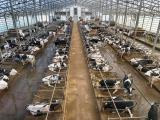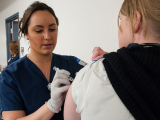May 10, 2007 (CIDRAP News) – The World Health Organization (WHO) said yesterday that "a number" of human vaccines against the H5N1 avian influenza may become available soon, but declined to say whether they should be used before a flu pandemic arises.
Besides the H5N1 vaccine approved by the US Food and Drug Administration in April, "a number of the most advanced candidate vaccines against H5N1 avian influenza might be registered within six months to two years," the WHO said in a question-and-answer bulletin on pandemic flu vaccines.
Vaccine developers are focusing on H5N1 because it is regarded as the virus most likely to evolve into a pandemic strain. But if it does, no one knows how much protection will be provided by vaccines based on current strains.
As they become available, "prepandemic" vaccines for H5N1 could be used in poultry workers, healthcare workers, or even whole populations, the WHO said, but the agency stopped short of recommending that step in advance of an actual pandemic.
"WHO's expert groups point out that the pandemic virus may be quite different than what people are immunized against and therefore the vaccine may not be protective, and that any decision about whether to use avian flu vaccines as a hedge against pandemic influenza must be done so with full knowledge of this fundamental uncertainty," the statement said.
"In the best scenario, such use of a vaccine would prove life saving," it continued. "In the worst, it would only have little effectiveness, and some experts consider such a use of the vaccine as an unfounded expenditure. WHO continues to review all of the scientific, health and social benefits and drawbacks with its experts and policies are regularly updated."
Once a flu pandemic virus is identified, it will take at least 4 to 6 months to produce the first doses of vaccine for it, the WHO said. Other predictions about the time needed to develop and start producing a pandemic vaccine have typically said at least 6 months.
In other comments, the WHO said a rapid increase in flu vaccine production capacity is likely in the next few years but cautioned that a universal flu vaccine may be more than a decade away.
The statement said drug companies are moving to increase vaccine production capacity "substantially," and capacity could "nearly double" by 2009. Current world capacity has been estimated at about 350 million doses of seasonal vaccine, with each dose targeting three flu strains.
In the next 3 to 5 years, the WHO said, "We will see movement towards increased vaccine production capacity in both industrialized and developing countries with a combined vaccine production capacity potentially above 3 billion doses per year." The current world population is more than 6 billion.
Concerning the goal of a broadly protective flu vaccine, the agency said, "An ideal influenza vaccine that would protect against all strains of influenza is still very much upstream in the pipeline, and might not be available in the next five to 10 years."
The WHO also commented briefly on steps for providing developing countries with pandemic vaccines. The agency is currently in a standoff with Indonesia, which has been withholding H5N1 virus samples from the WHO for months out of concern that they will be used by drug companies to produce vaccines priced out of Indonesia's reach.
For the short term, the WHO is working with UNICEF and industrialized countries to begin lining up funds to buy vaccines for developing countries, the statement said. For the longer term, the agency wants to (1) develop seasonal flu vaccination programs where appropriate and (2) establish vaccine production capacity in developing countries.
Other WHO plans for increasing the supply of pandemic flu vaccines include the following:
- Conducting a thorough survey of vaccine production capacity and anticipated demand
- Studying how to improve current low production yields with inactivated vaccines made from H5N1 viruses
- Investigating dose-sparing approaches to stretch vaccine supplies
See also:
WHO's "Questions and Answers on Pandemic Influenza Vaccine"
http://www.who.int/immunization/newsroom/PI_QAs/en/index.html
Apr 17 CIDRAP News story "FDA approves first H5N1 vaccine"


















